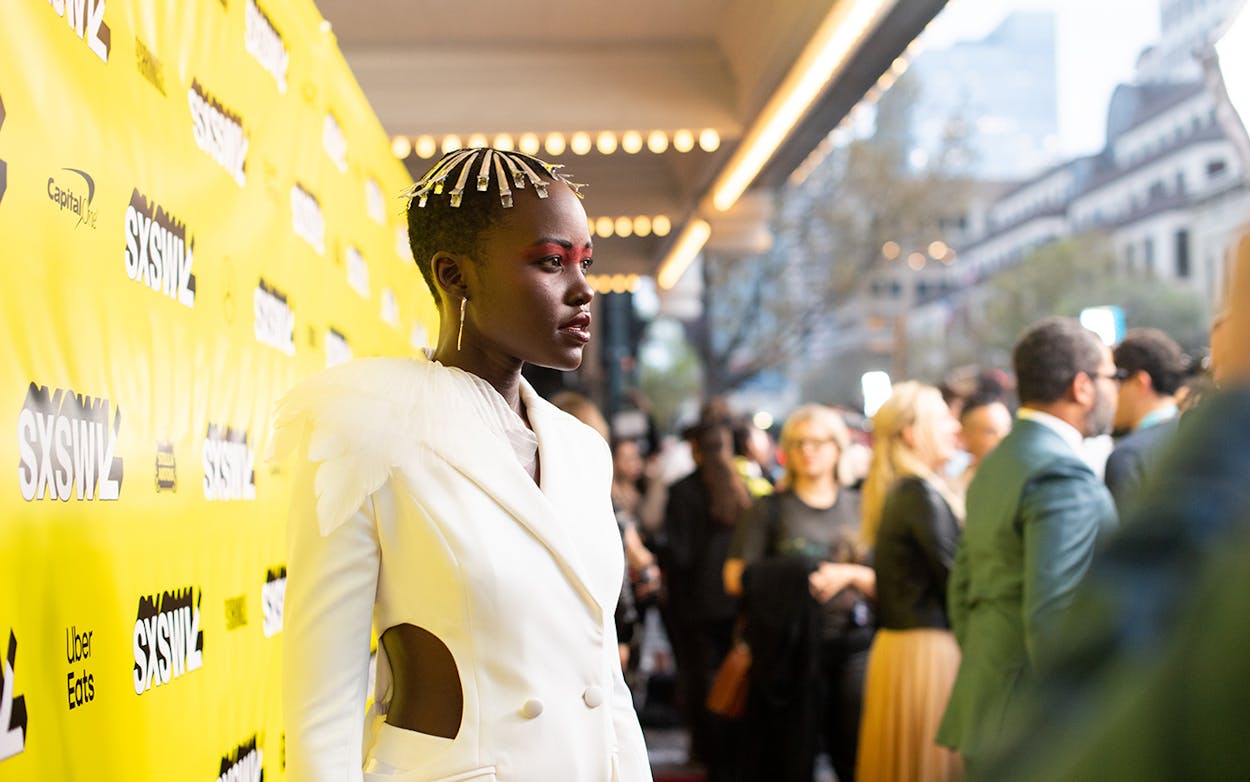Few actors start their careers as Lupita Nyong’o did. Her very first feature film role, in Steve McQueen’s Twelve Years a Slave, earned her an Academy Award. From there, as one of the most sought-after young stars in Hollywood, she managed her decisions very carefully. She focused on voice acting—a recurring role in the Star Wars franchise, the voice of Raksha in Disney’s live-action Jungle Book—and has only appeared on screen in select roles, once in 2015’s Disney family-friendly chess film Queen of Katwe, and once in Marvel’s Black Panther. (There was also a brief appearance, booked before Twelve Years a Slave was released, in the Liam Neeson vehicle Non-Stop.) That’s it. She won an Oscar in 2013, and opted to restrict her appearances afterward to prestigious, high-profile roles, often only with her voice.
Six years later, Nyong’o is busy. The third and fourth films she’s appeared in since she won an Oscar both played at SXSW, and the choices she’s made with them are similarly unconventional: They’re both horror films. It’s not unheard of for a horror movie star to transition into serious acting roles—Jamie Lee Curtis has been nominated for seven Golden Globes—but going from Academy Award winner to scream queen is a very deliberate choice.
Nyong’o’s SXSW oeuvre includes Us, the highly-anticipated follow-up to Get Out from writer/director Jordan Peele, and Little Monsters, a lower-profile horror-comedy out of Australia. She shines in both roles, although the two films stand in fairly sharp contrast—Us pulls off its ambitious turns only because Nyong’o is capable of making extremely complex material work, while Little Monsters doesn’t offer much audiences haven’t seen before.
Us, is an intense, expansive epic that eschews easy scares in favor of a broader horror based on world-building and heady character moments—all of which hinge on Nyong’o. The film is built around a series of twists that we won’t spoil here, and it’s difficult to imagine many of them working in the hands of a lesser actor. It’s hard, even, to imagine those twists being so effective if Nyong’o were a more familiar screen presence—there’s enough mystery to her, given the deliberate way she shaped her career, that she brings an uneasy aura to her dual roles in the film.
Little Monsters is a more conventional film. It’s a zombie comedy in the vein of Shaun of the Dead, set in Australia, starring Nyong’o as a kindergarten teacher who’s partnered with a loser uncle of one of her students to keep her class safe as zombies attack a field trip. The film pairs Nyong’o with Aussie newcomer Alexander English, who comes off like a Hill Country Fare version of a Hemsworth brother, playing through the beats typical for this kind of film: stock characters (English plays a slacker who agrees to chaperone the field trip because he has the hots for Nyong’o’s character, paragon of patience and virtue), little interest in exposition (the zombies come out of a U.S. military testing facility, with no other explanation required), and gross-out zombie kills played for laughs. But because the lead is an actor of Nyong’o’s caliber, she elevates the material. The part was written for any actor beautiful enough to make it immediately clear why a selfish man-child would suddenly sign on to take care of a bunch of kids, but Nyong’o takes what could be an insulting character (spoiler: after her co-chaperone displays a modicum of responsibility and compassion in the middle of a life-or-death crisis, the two fall in love) and imbues her with traits that make her compelling to watch. When she wants the kids to feel safe, she sings Taylor Swift songs to them with her whole heart; when she needs to intimidate the cowardly adults who present an obstacle to their safety, she does so with a flinty determination that would make her Non-Stop castmate Neeson jealous.
Starting your career with an Oscar is a very unusual first step. There’ve only been a handful of actors to do it, and the ones who were in Nyong’o’s position—old enough to play adult roles, and not already famous for a singing career—don’t offer a road map to follow. Nyong’o has made fascinating choices since her breakthrough. She wrote in Lenny Letter in 2017 that she opted to go to Broadway after winning her Oscar because “So often women of color are relegated to playing simple tropes: the sidekick, the best friend, the noble savage, or the clown. We are confined to being a simple and symbolic peripheral character—one who doesn’t have her own journey or emotional landscape.” Those stereotypes are far from her role in Us, and her work in Little Monsters shows that even when a role is trope-heavy, an actor of her caliber is capable of elevating it. As horror films like Get Out, Hereditary, and last year’s SXSW opener A Quiet Place are finding untapped creative potential and proving the genre’s relevance, it makes sense that an actor like Nyong’o would see horror as a place to do exciting, or even groundbreaking, work. Nyong’o’s unusual trajectory from “Oscar winner” to “scream queen” shows the possibilities that she sees in the genre—and that it’s worth further attention.








